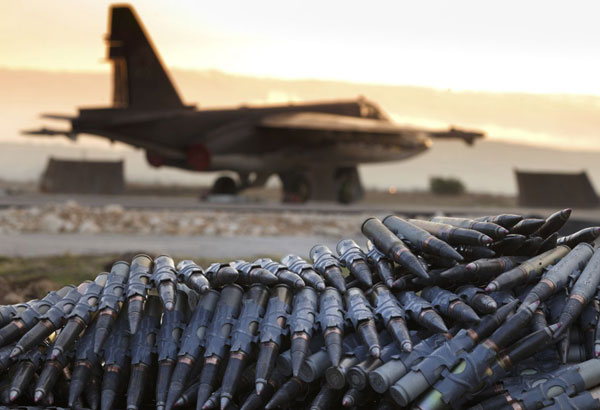Key moments in Russia's campaign, involvement in Syrian war

FILE - In this file photo taken on Friday, Dec. 18, 2015 provided by the Russian Defense Ministry Press Service, a load of ammunition is prepared to be loaded on to Russian war planes at Hemeimeem air base in Syria. Russia claimed Friday, June 16, 2017 it killed the leader of the Islamic State group in an airstrike on a meeting of IS leaders just outside the IS de facto capital in Syria. The Russian Defense Ministry said Abu Bakr al-Baghdadi was killed in a Russian strike in late May along with other senior group commanders. (Vadim Savitsky/Russian Defense Ministry Press Service via AP, file)
MOSCOW — Russia's announcement that the Islamic State group's leader Abu Bakr al-Baghdadi may have been killed in a Russian airstrike in Syria in late May — if confirmed — would be a huge military coup for Moscow as a key player in Syria's civil war and strengthen its hand in future peace talks.
It would also mark a climax in Russia's involvement in the Syrian conflict, in which it has sided with President Bashar Assad's government, from the first days of the air campaign two years ago to boots on the ground in the city of Aleppo.
The airstrike would also highlight the capabilities of Russia's modernized military, which has tested new precision weapons in Syria.
Here are some key moments in Russia's military campaign in Syria.
QUICK DEPLOYMENT
A series of major battlefield defeats suffered by Assad's army in 2015 prompted Moscow to intervene to protect its long-time ally. On August 26, 2015, Russia signed a deal with the Syrian government on deploying an air force contingent and other military assets at the Hemeimeem air base in Syria's province of Latakia, the heartland of Assad's Alawite religious minority.
In a matter of weeks, Russia's military built up the base so it could host dozens of Russian jets. It delivered thousands of tons of military equipment and supplies by sea and heavy-lift cargo planes in an operation dubbed the "Syrian Express." On Sept. 30, Moscow declared the launch of its air campaign in Syria — Russia's first military action outside the former Soviet Union since the federation's collapse.
TENSIONS WITH TURKEY
The Russian intervention angered Turkey, which has pushed for Assad's ouster and backed Syrian opposition forces since the start of the conflict in 2011.
On Nov. 24, 2015, a Turkish fighter jet shot down a Russian Su-24 bomber on the border with Syria. The pilot was killed by Turkey-backed Syrian opposition fighters as he parachuted from the plane, and a Russian marine was also killed during an operation to rescue the second pilot. Turkey said the Russian plane violated its airspace but Moscow denied that.
Putin described the downing as a "stab in the back" and responded with an array of economic sanctions, including a ban on the sales of tour packages to Turkey and imports of Turkish fruit and vegetables. The Russian military also beefed up its air defenses in Syria with the long-range S-400 missiles to force Turkey to back off.
FIGHTING FOR PALMYRA
In April 2016, Assad's forces, relying on Russian air support, scored a major symbolic victory by taking the ancient town of Palmyra from the Islamic State group. Russia deployed field engineers to clear mines from the world-famous archaeological site and then celebrated the victory with a concert by the St. Petersburg Mariinsky orchestra, led by renowned Russian conductor Valery Gergiev.
In December 2016, however, the Syrian army again lost Palmyra to IS. Assad's forces recaptured it in March, again under the Russian air cover and following fierce fighting.
BOOTS ON THE GROUND
Though most attention was focused on Russian airstrikes, Russia also became actively involved in ground operations. Senior Russian military officers were deployed alongside Syrian government troops to provide training, plan offensive operations and direct them in combat. Russia also dispatched special forces to conduct intelligence and coordinate air strikes. There were also some indications that Russian artillery units were deployed in key battlefield areas.
Russia's Defense Ministry never said how many troops it has in Syria, but turnout figures in voting from abroad in the September 2016 parliamentary elections indicated that Russian military personnel in the Arab nation at the time likely exceeded 4,300.
Russia has lost 38 servicemen in Syria so far, according to official data.
BATTLEFIELD TESTS
The Syrian war provided an arena for Russia's military to test its latest weapons in combat — including state-of-the art Kalibr cruise missiles launched by Russian strategic bombers, navy surface warships and submarines. The long-range precision-strike cruise capability has given a major boost to the Russian military.
In another first, Russia's sole aircraft carrier, the Admiral Kuznetsov, sailed to the Eastern Mediterranean last fall to launch the first carrier-borne combat missions in Russia's navy history, during the months-long battles between Syrian government forces and the rebels for Aleppo, Syria's largest city and once its commercial hub.
Other weapons for the first time tested in combat included the Su-34 and the Su-35 warplanes, and the Mi-28 and the Ka-52 helicopter gunships.
President Vladimir Putin said in a national call-in show on Thursday that the Syrian campaign provided a "priceless" experience for the Russian military.
BATTLE FOR ALEPPO
In December 2016 the Syrian army won full control of Aleppo, Assad's greatest victory in the war, now in its seventh year. The fall of the city, which was divided into government- and rebel-controlled parts since 2012, demoralized the rebels, depriving them of the largest urban area under their control. Russian air support helped cut rebels' communications and supply lines.
Assad's victory followed ferocious battles, in which thousands died, and left the rebel enclave in ruins. Russia now has deployed hundreds of military police to patrol the city's former rebel-held eastern part.
RUSSIA-TURKEY RAPPROCHEMENT
Faced with massive damage from Russia's economic sanctions, Turkish President Recep Tayyip Erdogan sought to mend ties, offering apologies for downing the Russian warplane in June 2016. Putin responded by strongly backing Erdogan during a failed military coup in Turkey.
Since then, the two leaders have held several meetings and frequent phone talks to narrow their differences on Syria. Turkey is also credited with playing a key role in negotiating the withdrawal of the opposition forces from Aleppo.
Also, earlier this year, Russia, Turkey and Iran brokered several rounds of Syria peace talks in Kazakhstan's capital, Astana. Those meetings — though separate from the UN backed Syria peace talks in Geneva — brought together the Syrian government and its foes. In May, the three powers, which back opposing sides in the war, negotiated in Astana a deal on so-called "safe zones" in Syria, which was welcomed by the UN But the parties are still to finalize the boundaries of the zones and work out monitoring details in talks expected to be held in the coming weeks.
- Latest
- Trending
































